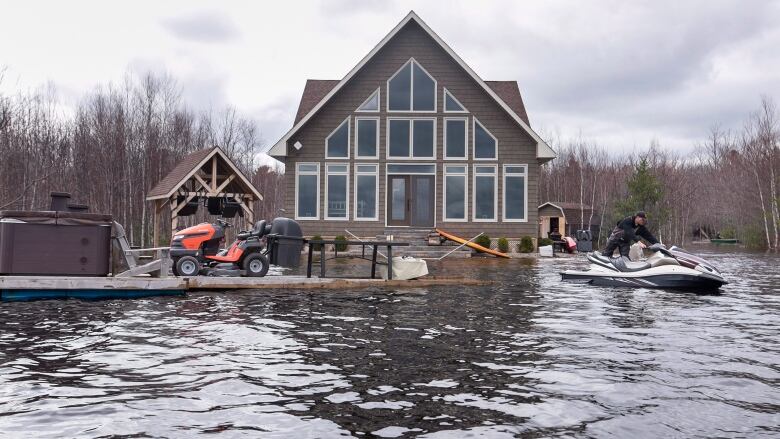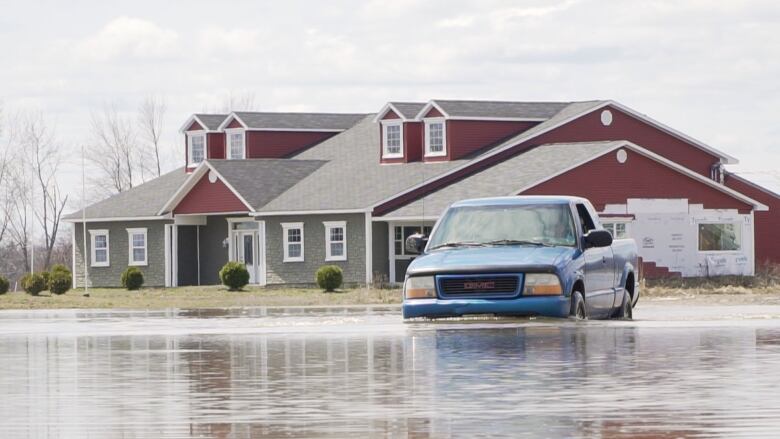N.B. launches disaster financial aid program in wake of flooding
Program will support individuals, small businesses and municipalities

New Brunswick has launched a financial aid program for people affected by severe flooding across the province, Premier Brian Gallant announced Wednesday.
Gallant said an emergency cabinet meetingwas held Wednesday morning to discuss a disaster financial assistance program for individuals, small businesses and municipalities that suffered property damage as a result of flooding.
"Keeping New Brunswickers safe is our priority at the moment, getting people out of harm's way is out number one focus," Gallant told a news conference, "but we want people to know there will be a disaster financial assistance program that will be available to help ease the financial burden for residents who have been impacted by the flood."

The announcement comes on the sixth day of flooding, and there's no relief coming in the next few days for Fredericton and communities along the southern reaches of the St. John River. Officials warned the public of likely record-setting water levels to come by the weekend.
"We believe the water levels are exceeding the 2008 levels and will potentially exceed the 1973 levels, so really this is an event that we have, for many people, for many communities, not seen before," Gallant said.
Officials in various communities have said the extent of the damage is unknown at the moment. In 2008, the flood caused more than $23 million in damage.
Anyone that wishes to evacuate their home, please call and register with the Red Cross (1-800-863-6582) who can help with accommodations if necessary. If you do not need help with accommodations you are still asked to register with the Red Cross.
—@Gov_NBGallant urged the public to take measures to protect their property and belongings, but the premier asked residents to strongly consider evacuating while they still can.
The Red Cross said Wednesday afternoon it has assisted 260 people from 100 homes across the province. Officials said evacuations are continuing, particularly in the Maugerville area, and that more road closures are expected.
Program details
According to a release from the Department of Public Safety, the assistance program is offered to repair and clean structures and to replace basic necessities. Assistance is not available for recreational properties.
The maximum assistance for structural repairs to private residences is $160,000while the maximum for small businesses and not-for-profit organizations is $500,000.
People can report flood-related damage by calling Service New Brunswick TeleServices at 1-888-298-8555 from 8 a.m. to 7:30 p.m. on weekdays and 9 a.m. to 1 p.m. on the weekends, or by registering online on the New Brunswick Emergency Measures Organization's website.
Be cautious with drinking water and food supplies when cleaning up during and following flooding in your home and area.https://t.co/8ftHw1eKl1
—@Gov_NBThe damage assessments will be reviewedand health and safety inspection teams may be dispatched if required.
The threshold for the provincial government's disaster financial assistance program is $2.2 million.
Gallant said the province is also waiving fees for well-water testing, electrical permits and collection of flood debris in local service districts.
Contact insurance provider
Residents, tenants, small businesses and not-for-profit organizations should contact their insurance companies to report property damage before discarding or destroying anything, and take photographs of the damage, said Geoffrey Downey, spokesman for the Department of Justice and Public Safety.

They should keep receipts for any repairs or replacement purchases for any uninsurable losses, and log the number of hours they or others put into the cleanup, he said.
"Document everything," Downey advised.
De-energize
If the water is approaching their electrical baseboards or outlets, they should call NB Power at 1-800-663-6272 to disconnect their electricity as soon as possible, Downey urged.
"Water and electricity is a dangerous combination, if not deadly," he said. "This is a job for professionals."
People should not use any flooded electrical outlets, switch boxes, fuse-breaker panels or appliances until they have been checked by NB Power or the Department of Public Safety's electrical inspectors.

Although the electrical equipment may work and appear safe, it could cause electrocution or a fire, officials warn.
If their power has been turned off, they will have to call in a local electrical inspector or licensed electrical contractor before NB Power will re-energize their home.
Similarly, heating systems whether electrical, gas or wood must be inspected by a qualified technician before being used.
Pump with care
People should also be cautious when pumping water out of their basements. Pumping it out too soon could cause structural damage or collapse the basement.
As a safety precaution, basement water levels should not be more than 30 centimetres (one foot) lower than the outside water level, officials advise.
Once all of the water is removed, people should ensure the building is structurally safe by checking for buckled walls or floors.
Solid wood or metal furniture can be cleaned with a household detergent, but upholstered furniture, mattresses and other contaminated belongings should be disposed of.
Water-soaked walls and insulation will need to be discarded and replaced to avoid mould and mildew, which can cause health problems.
Walls, solid floors and ceilings should be thoroughly scrubbed with detergent or soap and water while wearing protective clothing and rubber gloves.
Opening windows and doors can help with the drying process.












_(720p).jpg)


 OFFICIAL HD MUSIC VIDEO.jpg)
.jpg)



























































































